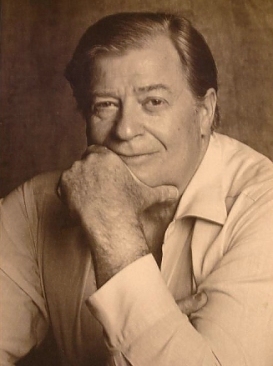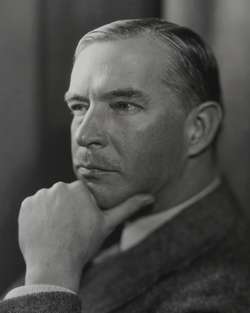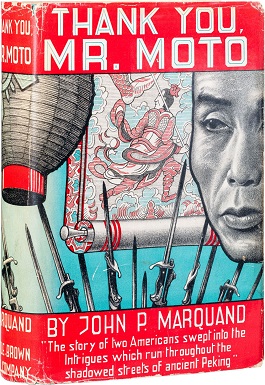Related Research Articles

James Clavell was an Australian-born, British-raised and educated, naturalized-American writer, screenwriter, director, and World War II veteran and prisoner of war. Clavell is best known for his Asian Saga novels, a number of which have had television adaptations. Clavell also wrote such screenplays as those for The Fly (1958), based on the short story by George Langelaan, and The Great Escape (1963), based on the personal account of Paul Brickhill. He directed the popular 1967 film To Sir, with Love, for which he also wrote the script.

John Phillips Marquand was an American writer. Originally best known for his Mr. Moto spy stories, he achieved popular success and critical respect for his satirical novels, winning a Pulitzer Prize for The Late George Apley in 1938. One of his abiding themes was the confining nature of life in America's upper class and among those who aspired to join it. Marquand treated those whose lives were bound by these unwritten codes with a characteristic mix of respect and satire.

Mr. Moto is a fictional Japanese secret agent created by the American author John P. Marquand. He appeared in six novels by Marquand published between 1935 and 1957. Marquand initially created the character for the Saturday Evening Post, which was seeking stories with an Asian hero after the death of Charlie Chan's creator Earl Derr Biggers.

Anna Katharine Green was an American poet and novelist. She was one of the first writers of detective fiction in America and distinguished herself by writing well plotted, legally accurate stories. Green has been called "the mother of the detective novel".
Philip MacDonald was a British-born writer of fiction and screenplays, best known for thrillers.
The Late George Apley is a 1937 novel by John Phillips Marquand. It is a satire of Boston's upper class in the late 19th and early 20th centuries. The title character is a Harvard-educated WASP living on Beacon Hill in downtown Boston. The book is an epistolary novel, made up mostly of letters to and from the title character. It is subtitled "A Novel in the Form of a Memoir", because the letters and other personal documents are quoted by another character, Apley's biographer.
John Stone was an American film producer and screenwriter. He was born in New York City and died in Los Angeles, California. He produced more than 70 films between 1930 and 1946. He also wrote for more than 60 films between 1921 and 1948, often during the early 1920s using the pen name Jack Sturmwasser. He was the father of the screenwriter and playwright Peter Stone.

Think Fast, Mr. Moto is a 1937 American mystery film directed by Norman Foster and featuring a mysterious Japanese detective named Mr. Moto. It is the first of eight films in the Mr. Moto series, all based on the character Mr. Moto created by John P. Marquand. The film stars Peter Lorre as the title character, Virginia Field, Thomas Beck and Sig Ruman. Mr. Moto works to stop a secret smuggling operation.

Thank You, Mr. Moto is a 1937 American mystery film directed by Norman Foster. It is the second in a series of eight films starring Peter Lorre as Mr. Moto. It was based on the novel of the same name by the detective's creator, John P. Marquand. Mr. Moto battles murderous treasure hunters for priceless ancient scrolls which reveal the location of the long-lost tomb of Genghis Khan.

Mysterious Mr. Moto, produced in 1938 by Twentieth Century Fox, is the fifth in a series of eight films starring Peter Lorre as Mr. Moto.
Thank You, Mr. Moto may refer to:

Thank You, Mr. Moto, was originally published in serial form in the Saturday Evening Post from February 8 to March 14, 1936, this novel was first published in book form in 15 May 1936.
Mr. Moto's Last Warning is the sixth in a series of eight films starring Peter Lorre as Mr. Moto.
Mr. Moto Is So Sorry was originally published in serial form in the Saturday Evening Post from July 2 to August 13, 1938, and was first published in book form in 1938. It is the fourth of six Mr. Moto novels and can also be found in the omnibus Mr. Moto's Three Aces published in 1939.

Mr. Moto Takes a Chance is the fourth in a series of eight films starring Peter Lorre as Mr. Moto, although it was the second one actually filmed, following Think Fast, Mr. Moto. Its release was delayed until after production of Thank You, Mr. Moto and Mr Moto's Gamble.
Mr Moto Takes A Vacation (1939) is a Norman Foster-directed entry in the Mr. Moto film series, with Lionel Atwill and Joseph Schildkraut and George P. Huntley, Jr, as Archie Featherstone, in supporting roles.

Stopover Tokyo is a 1957 American film noir crime film directed by Richard L. Breen and starring Robert Wagner, Joan Collins, Edmond O'Brien and Ken Scott. Filmed in Japan in CinemaScope, the film is set in Tokyo and follows a US counterintelligence agent working to foil a communist assassination plot.

Mr. Moto in Danger Island is a 1939 American mystery film directed by Herbert I. Leeds and starring Peter Lorre, Jean Hersholt and Amanda Duff. It is part of the Mr. Moto series of films.
Last Laugh, Mr Moto is a 1942 Mr Moto novel by John P. Marquand.
"Sincerely, Willis Wayde" was an American television play broadcast on December 13, 1956, as part of the CBS television series, Playhouse 90. It was the 11th episode of the first season of Playhouse 90.
References
- ↑ T. O'Conner, Patricia (August 10, 1986). "NEW & NOTEWORTHY". The New York Times .
- ↑ Orient Adventure: NO HERO. By J.P. Marquand. 281 pp. Boston: Little, Brown & Co. $2. Beckwith, E C. New York Times 1 Sep 1935: BR7.